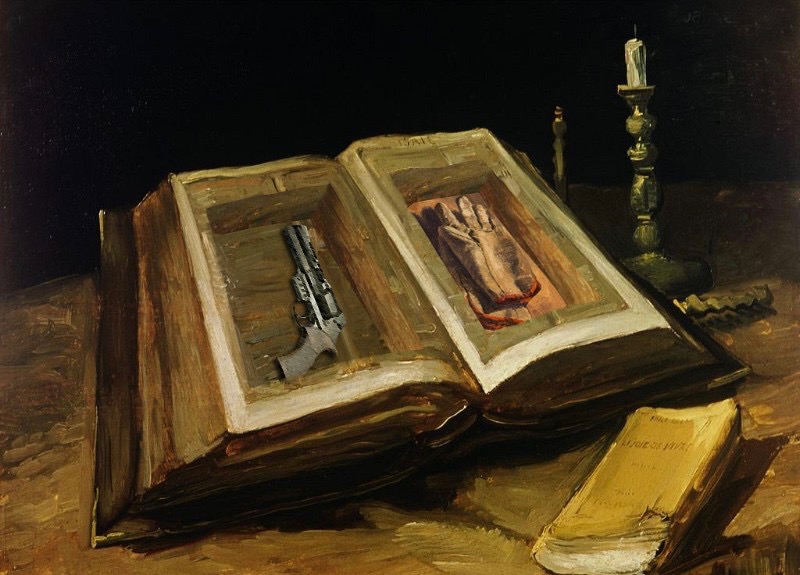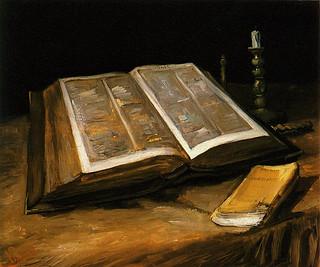When the Bible is Bad for You

When the Bible is Bad for You
Brian Zahnd
I love the Bible. I read the Bible. I read the Bible every day. I’ve been a serious student of the Bible for over forty years. I don’t know how many Bibles I’ve owned — I would guess close to a hundred. I’ve written 3,247 sermons from the Bible. My point is, I’ve got some serious Bible cred!
But here’s something else I know: The Bible can be bad for you!
Bible reading as part of a spiritual formation regiment can be extremely beneficial in helping form disciples of Jesus in Christlikeness. But this isn’t always the case. There are ways of approaching the Bible, reading the Bible, using the Bible that are detrimental to the soul. Because the Bible is such a powerful thing, the misuse of it can be extremely dangerous.
As a pastor I’ve seen people do real harm to themselves and others with the Bible. This is why I have on occasion counseled a troubled soul to either restrict their Bible reading to the Gospels or even stop reading the Bible all-together for a season. There have also been times when I have instructed people to stay away from the Book of Revelation until they were in a healthier mental state and had received some instruction on how to properly interpret it. (An ignorant and irresponsible reading of Revelation can really mess people up!) Sometimes, as strange as it may seem, trying to temporarily corral people’s Bible reading is part of being a pastor tasked with caring for Christian souls.
We get in trouble with the Bible when we lose sight of its chief value: To point us to Jesus. The Bible is not an end in itself. The Bible is not God. The Bible is not the object of our faith. Jesus is our goal. Jesus is God. Jesus is the one in whom we place our faith. The value of the Bible is that it is the word of God that faithfully directs us to the Word of God who is Jesus Christ. If we lose sight of this, we can find ourselves wandering away from life and into the dark realm of spiritual death while assiduously reading the Bible! Jesus said it this way,
“You search the scriptures because you think that in them you have eternal life; and it is they that bear witness about me. Yet you refuse to come to me to have life.” –John 5:39, 40
The Pharisees made the tragic mistake of making the Bible an end in itself. They used it as a collection of prooftexts to justify themselves while condemning others. They substituted the accumulation of Bible knowledge for actually doing the will of God. They weaponized the Bible and used it cruelly on their enemies. And modern day Pharisees do the same thing with the Bible. In her novel Wuthering Heights, Emily Brontë describes an insufferable, judgmental Christian with this withering sentence,
“He was, and is yet, most likely, the wearisomest, self-righteous pharisee that ever ransacked a Bible to rake the promises to himself, and fling the curses on his neighbours.”
If we don’t see the Bible as directing us to the true Word of God who is Jesus, we can play tricks with the Bible. We can make it do our bidding. We can make it roll over and fetch. We can make it stand on its hind legs and dance a jig. If we just want to proof-text our own opinion, we can do that with a concordance and a bit of cleverness in ten minutes.
“The Bible clearly says, _______________________________________.”
(Fill in the blank with what you want to believe socially, scientifically, politically, theologically.)
It’s a game of proof-texting. And there is little you can’t “prove” with the Bible if that’s the game you want to play. Wars of conquest, capital punishment, the institution of slavery, women held as property, and genocidal ethnic cleansing can all be (and have been) justified by the Bible. But Jesus doesn’t endorse any of those things! If Christians aren’t going to read the Bible in the light of Christ, they would be better off not reading it at all!
For Christians the first half of the Bible is the inspired story of how we get to Jesus — the Word of God incarnate. And as Christians we should have no problem recognizing the changes in perspective that occur along the journey. Ritual sacrifice, Torah sanctions, and killing in the name of God are all eventually re-evaluated. Sacrificing animals, stoning Sabbath-breakers, and slaughtering Canaanite children all belong to the story of how the chosen people arrive at Messiah. But once Messiah has come, everything must be re-evaluated according to what Jesus taught. Jesus saves the Bible from itself. It’s Jesus who saves the Bible from being just another violent and vengeful religious text.
Speaking of violent religious texts. The same kind of criticism that Christians often level at the Koran can also be leveled at the Bible if that’s how we want to read it. I’m not an authority on the Koran, but I know very well you can justify all kinds of atrocity by reading the Bible as a flat text and apart from the light of Christ. This is when the Bible is bad for you!
If the Bible becomes a barrier to true discipleship by providing legal loopholes for avoiding what Jesus taught his disciples in the Sermon on the Mount, that’s when the Bible is bad for you. It’s true. There is a way of reading the Bible that is bad for you!
If you want a violent, retributive God, the Bible will give that to you.
If you want capital punishment, the Bible will give that to you.
If you want to hate your enemies, the Bible will give that to you.
If you want divine warrant for your every opinion, the Bible will give that to you.
If you want to be a smug, self-righteous, know-it-all, the Bible will give that to you.
If you want assurance that only people like you are going to heaven, the Bible will give that to you.
And that’s when the Bible is bad for you!
But if you want peace, nonviolence, mercy, forgiveness, reconciliation, humility, advocacy, and love, the Bible will also give that to you. But it will do so by faithfully pointing you to Jesus! When we look to the Bible without self-interested agenda, the Bible says to us, “Now look to Jesus, for he is the true Word of God.” When the Bible becomes a faithful and trusted guide to lead you to Jesus, that’s when the Bible is good for you!
BZ
(The artwork Mafia Bible; a parody of Van Gogh’s Still Life with Bible.)

PS: So how do we read the Bible so that it’s good for us and not bad for us? Here are ten bits of pastoral counsel…
1. Don’t make the mistake of reading the Bible as a “flat text.”
2. Recognize that there is no such thing as a “plain reading of Scripture.”
3. Admit that parts of the Bible are genuinely difficult to understand.
4. Read the Bible in community with the whole Church.
5. Don’t read the Bible for the purpose of gathering ammunition.
6. Center your reading of the Bible in the Gospels.
7. When reading the Gospels allow yourself to fall into the story and be with Jesus.
8. Read the Bible in close connection with prayer.
9. Sit humbly with the Bible and let the Holy Spirit talk to you about you.
10. Remember that the goal of Christian discipleship is to love like Jesus.